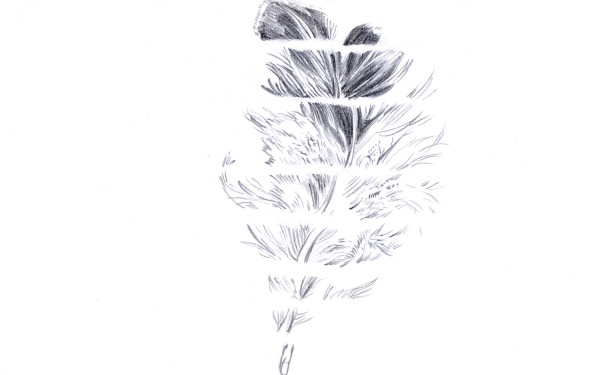Missing and Murdered but Never Forgotten
Montreal’s Annual March for Aboriginal Women Demands Federal Inquiry
Saturday’s rain didn’t stop hundreds from gathering in Place Émilie-Gamelin in memory of Canada’s roughly 1,200 missing and murdered indigenous women.
A ninth annual vigil was held in more than 100 cities across the country, and as far away as France and California, to commemorate the deaths of more than a thousand indigenous women since 1980.
“I really wish we didn’t have to have this march and this vigil,” said Maya Rolbin-Ghanie of the Centre for Gender Advocacy, one of the vigil’s organizers.
“I really wish that this was the last one that we ever have and that I would never hear of another case of a missing or murdered native woman or girl ever again.”
Those present carried candles to remember women like Loretta Saunders, who was found dead off Route 2 of the Trans-Canada highway in New Brunswick earlier this year.
Saunders, a 26-year-old criminology and sociology major at St. Mary’s University in Halifax, was killed by her two roommates and left on the highway three hours away from her apartment, where she lay covered in snow until police found her.
In August, Winnipeg police found the remains of 15-year-old Tina Fontaine in the Red River more than a week after she went missing. Fontaine had been in the care of Child and Family Services before she ran away.
“She’s a child. This is a child that has been murdered,” Sgt. John O’Donovan from Winnipeg police told CBC. “Society should be horrified.”
1_700_1050_90.jpg)
Mohawk activist Ellen Gabriel told the crowd on Saturday that she remembered standing at the first Montreal vigil surrounded by only 20 or so people.
“When it first came to light, people didn’t care about it,” Gabriel said. “They thought it was a domestic issue, it’s in the homes, so it’s not important to address.”
The peaceful vigil marched along Berri Street, eventually winding onto St. Laurent Boulevard, chanting “Bring our sisters home” and asking “How many missing until you start listening?” Buffalo Hat Singers, a contemporary powwow group, performed and played along the way.
At Parc des Amériques, candles given out lit the faces of supporters from Aboriginal and non-Aboriginal backgrounds alike. A family wearing masks with “Am I Next?” written on them huddled together to protect the flames from the wind and rain.
Amidst the speeches and final performances, MNA Françoise David from Québec solidaire recalled the left-wing provincial party’s support for a national inquiry.
“The struggle of Aboriginal women is the struggle of all women,” she said.
Earlier this year, the RCMP released a national report on incidents of missing and murdered Aboriginal women from 1980 to 2012. According to the report, 1,017 Aboriginal women were murdered. The number until then had been believed to be around 600.
The 164 missing Aboriginal women make up 11 per cent of the total number of missing Canadian females, although Aboriginal women only make up 4.3 per cent of the female population. Homicide statistics for Aboriginal women are even worse, representing 16 per cent of female homicides.
The dismal state of Aboriginal welfare and the lack of a federal inquiry into the violence against women has hurt Canada’s image as a human rights defender, and has been named a national shame by the United Nations, Human Rights Watch and Amnesty International.
In May, UN Special Rapporteur on the Rights of Indigenous Peoples James Anaya met with government officials and released a report urging Canada to hold an inquiry. Human Rights Watch did so in 2013. This year also marks a decade since Amnesty International’s original “Stolen Sisters” report calling for an end to discrimination and violence towards Aboriginal women.
These high-profile human rights organizations urge the government to put in place a national inquiry, which native organizations have been demanding for years.
Last month, the federal government announced a plan with a $25-million budget to end violence against native women, but Stephen Harper has refused to hold a public inquiry.
The RCMP report says 105 Aboriginal women are still missing and there have been 120 unsolved homicides between 1980 and 2012. But Canada’s national police say 90 per cent of cases have been solved and there is no discrimination between Aboriginal and non-Aboriginal victims when it comes to solving cases.
The first vigil for missing and murdered women was held on Oct. 4, 2005, the anniversary of the death of Gladys Tolley, who was struck by a Sûreté du Québec police car on the Kitigan Zibi reserve in 2001.

3_900_600_90.jpg)


1_600_375_90_s_c1.jpg)

_600_375_90_s_c1.JPG)
_600_375_90_s_c1.jpg)